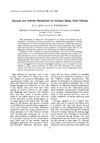 33 citations,
April 2020 in “Journal of Clinical Investigation”
33 citations,
April 2020 in “Journal of Clinical Investigation” Stress in hair follicle stem cells causes inflammation in a chronic skin condition through a specific immune response pathway.
 5 citations,
May 2022 in “Biomedicines”
5 citations,
May 2022 in “Biomedicines” Botryococcus terribilis and its compounds may promote hair growth and improve hair health.
The document concluded that home treatments are needed for hair loss control, but professionals should better understand how these treatments work.
414 citations,
August 2005 in “Nature” Activating TERT in mice skin boosts hair growth by waking up hair follicle stem cells.
 222 citations,
January 2005 in “Endocrine journal”
222 citations,
January 2005 in “Endocrine journal” Melatonin is important for skin health and protection, and can be made by the skin or applied to it.
 131 citations,
August 2000 in “International Journal of Dermatology”
131 citations,
August 2000 in “International Journal of Dermatology” Inflammation may be linked to hair loss, and targeting specific enzymes could help treat it.
 99 citations,
December 2010 in “Journal of The European Academy of Dermatology and Venereology”
99 citations,
December 2010 in “Journal of The European Academy of Dermatology and Venereology” The document concludes that certain genetic mutations and dietary factors are involved in acne development, and treatments like isotretinoin and diet changes can help manage it.
76 citations,
October 2016 in “Clinics in dermatology” Sex hormones, especially androgens, play a key role in causing acne.
 74 citations,
March 1963 in “Archives of Dermatology”
74 citations,
March 1963 in “Archives of Dermatology” Triparanol therapy can cause hair loss and skin dryness without inflammation or damage to hair follicles or skin structures.
54 citations,
September 2012 in “The journal of investigative dermatology/Journal of investigative dermatology” Vitamin A affects hair loss and immune response in alopecia areata.
51 citations,
November 1998 in “The journal of investigative dermatology/Journal of investigative dermatology” Beard cells, unlike scalp cells, produce growth factors in response to testosterone, which may explain differences in hair growth.
24 citations,
June 1999 in “Mechanisms of Development” Ornithine decarboxylase is crucial for hair growth and follicle development.
20 citations,
March 1975 in “Journal of steroid biochemistry/Journal of Steroid Biochemistry” The study concludes that a genetic mutation in TFM mice leads to reduced androgen receptor activity, affecting the body's response to male hormones.
 18 citations,
September 2013 in “Technology”
18 citations,
September 2013 in “Technology” The study introduced a new imaging technology to track skin healing and bone marrow cell activity over time.
 18 citations,
March 2009 in “Medical Hypotheses”
18 citations,
March 2009 in “Medical Hypotheses” The document suggests that blocking sweat glands with antiperspirants might allow skin-generated hormones to be absorbed, possibly increasing breast and prostate cancer risk.
15 citations,
September 2016 in “Trauma Monthly” Linum usitatissimum gel improves wound healing and tissue regeneration.
 14 citations,
March 2017 in “Brain research”
14 citations,
March 2017 in “Brain research” Progesterone and its byproducts control a specific receptor in the brain independently of progesterone receptors, affecting conditions related to the menstrual cycle.
 14 citations,
April 2000 in “Animal Science/Animal science”
14 citations,
April 2000 in “Animal Science/Animal science” Nutrients like vitamins, copper, zinc, and amino acids are crucial for healthy hair and wool growth.
13 citations,
May 2021 in “FASEB bioAdvances” Plant-based products can improve hair and skin health without harmful side effects.
 8 citations,
April 1965 in “Archives of biochemistry and biophysics”
8 citations,
April 1965 in “Archives of biochemistry and biophysics” Sheep wool follicles can metabolize both glucose and acetate using different pathways important for wool growth.
 7 citations,
April 2013 in “Clinical and Experimental Dermatology”
7 citations,
April 2013 in “Clinical and Experimental Dermatology” Tianeptine, an antidepressant, may prevent stress-induced hair loss in mice.
6 citations,
April 2023 in “Cosmetics” Exosomes could be effective for improving skin health and treating skin diseases.
 6 citations,
April 2020 in “Applied sciences”
6 citations,
April 2020 in “Applied sciences” Hair growth medium helps heal wounds and regrow hair in mice.
3 citations,
March 2019 in “Acta histochemica” Angiotensin II is found at higher levels in black sheep skin and may influence coat color.
 2 citations,
March 2014 in “Dermatologic Clinics”
2 citations,
March 2014 in “Dermatologic Clinics” The editor suggests removing "race" and "ethnicity" from dermatology and creating tools to objectively assess skin color and hair texture.
 1 citations,
December 2022 in “bioRxiv (Cold Spring Harbor Laboratory)”
1 citations,
December 2022 in “bioRxiv (Cold Spring Harbor Laboratory)” Pangolins have lost some skin-related genes, but kept others, showing complex skin evolution.
 1 citations,
December 2015 in “Endocrinology”
1 citations,
December 2015 in “Endocrinology” Decanoic acid may help treat PCOS by reducing androgen levels and improving glucose sensitivity.
 December 2024 in “Journal of Biophotonics”
December 2024 in “Journal of Biophotonics” Dual wavelength LEDs may help reduce hair loss by lowering DHT levels.
 May 2024 in “Brain disorders”
May 2024 in “Brain disorders” Agmatine may help reduce seizures linked to hormone changes in female rats.
 December 2021 in “Research Square (Research Square)”
December 2021 in “Research Square (Research Square)” Hair growth-promoting nutraceuticals do not block the cancer-fighting effects of tamoxifen and may enhance its action.



















